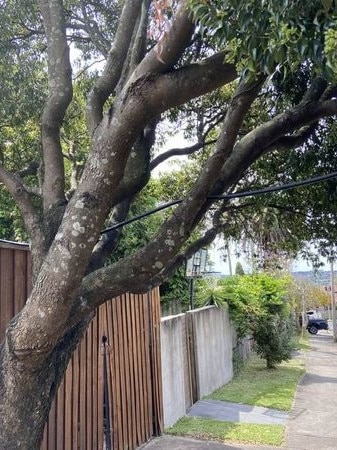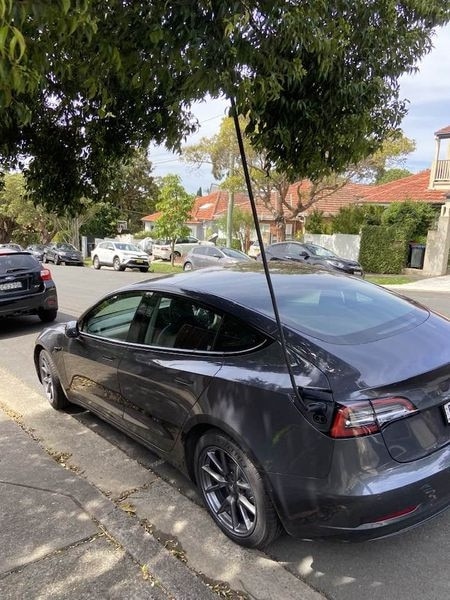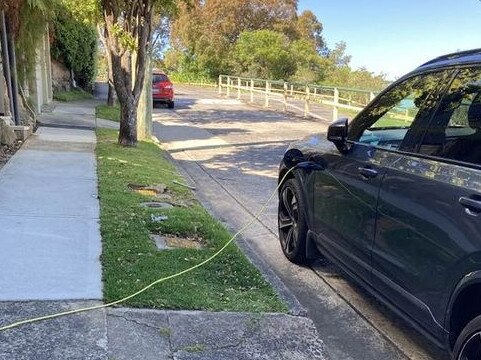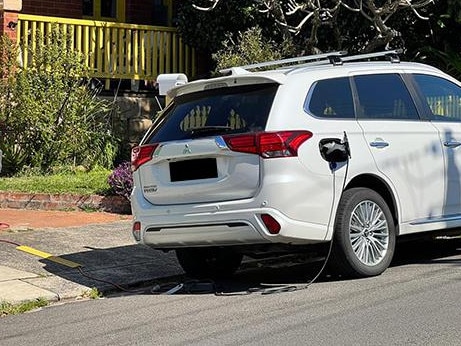Sydney EV owners running power cords onto paths, trees to charge cars
Electric vehicle owners in one Sydney area have copped a warning from the council for the methods being used to recharge their cars, running extension cords onto streets and even into trees.
NSW
Don't miss out on the headlines from NSW. Followed categories will be added to My News.
A Sydney council has warned residents about the safety risks of running power cords into public streets to charge their electric cars, after more images emerged online of the risky practice.
Several incidents of hazardous extension cords crossing footpaths and fences in the Mosman suburb have been shared in the past few days on social media.
In one incident, a resident hooked a power cord through a tree over public land to charge their electric car.
A Mosman council spokeswoman urged residents to instead use one of three publicly available electric vehicle fast charging stations in that suburb.
“Connecting power to a vehicle using this method is potentially unsafe to the public,” she said.


A NSW Fire and Rescue spokesman said failing to use an approved charging system was “not ideal” and added a fire risk to homes.
“I think when you’ve got cables going across metal fences, through trees and out to a vehicle, coming off household power, it’s not ideal, it’s not good practice,” he said.

“As time goes on and equipment wears out, it adds to the fire risk of the home.
“There’s nothing to protect it from the weather, the elements and vandals.”
Electric Vehicle Council chief executive Jafari Behyad said everyone would acknowledge “this isn’t an ideal situation”.
“While there are fewer EVs on the road, there is room for local councils to investigate whether a properly covered charger can be used safely from the home in a way that protects pedestrians using the sidewalk,” he said.
“But we obviously don’t want a future where there is a cord hanging from every home.”
The long-term answer is to build more public charging solutions, he said.

A City of Sydney Council spokesman said they had more than 100 charging points in their area and was not aware of any incidents in their area.
“Our footpaths need to remain accessible and using extension cords for any purpose in this public space presents a potential trip hazard,” he said.
“The City encourages residents to find more suitable alternatives.”
Parking Australia chief executive Stuart Norman said he was speaking on this very issue next week at a Sustainable Parking Seminar, and that there are 3 million homes in Australia without a driveway or garage.
He said it’s the responsibility of councils to provide and manage on-street parking - and therefore EV charging on-street.

“It’s astounding that there seems to be a focus from the Federal Government on high speed EV charging but not where people live,” he said.
“Not until this issue is addressed will we see mass take up of EV’s in our inner suburbs.”
Mr Norman said in the future, electric vehicle owners would need to charge their car only once per week, on average. By his calculations, this would mean councils would only require one charger on the street per seven houses, and could use parking apps to efficiently operate such a system.





